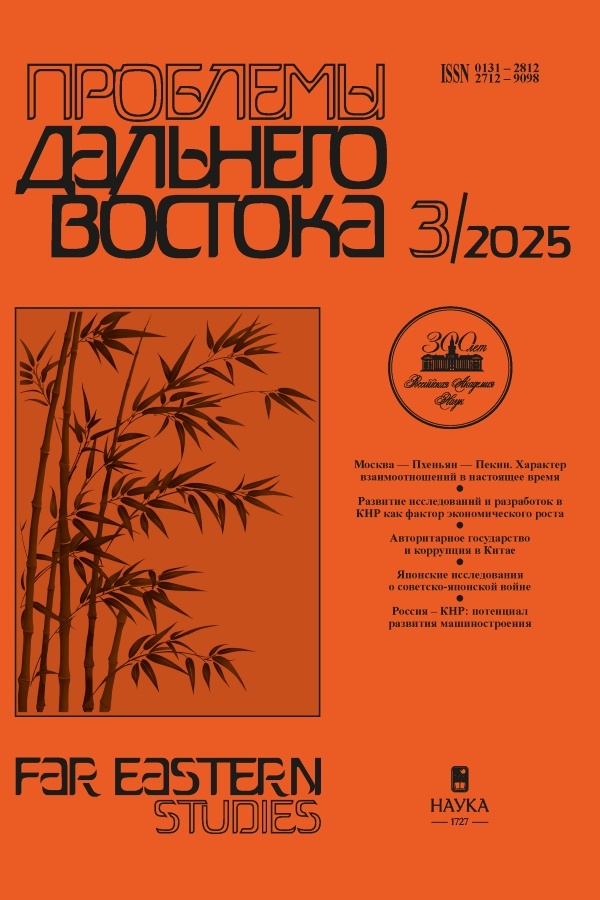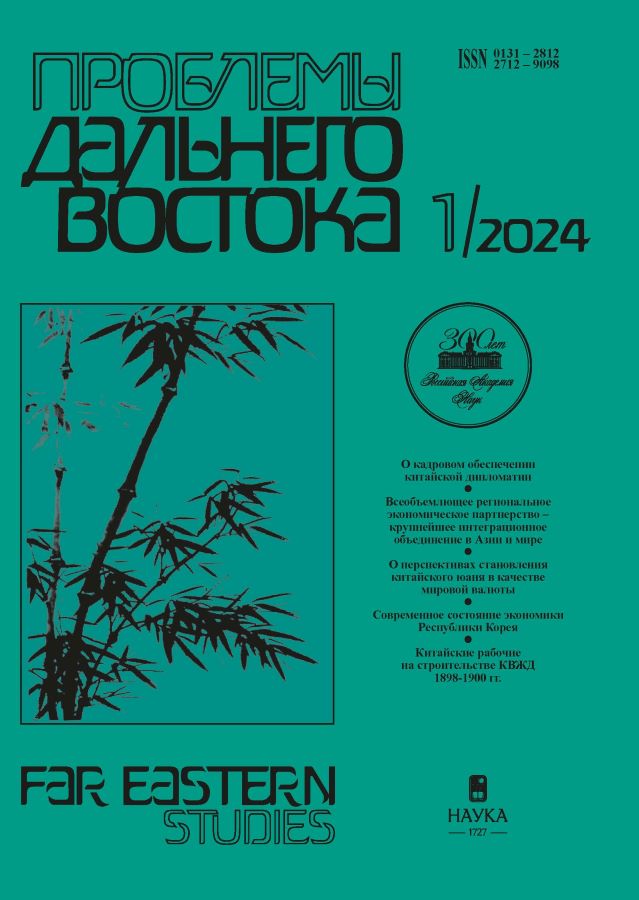The Palace Coup of 1900 in China (Based on the Materials of the Archive of Foreign Policy of the Russian Empire)
- Authors: Li D.1
-
Affiliations:
- Lomonosov Moscow State University
- Issue: No 1 (2024)
- Pages: 153-165
- Section: History
- URL: https://cijournal.ru/0131-2812/article/view/676387
- DOI: https://doi.org/10.31857/S0131281224010128
- ID: 676387
Cite item
Abstract
The article analyzes the palace coup in China in January 1900 on the basis of diplomatic documents based on diplomatic documents preserved in the Archive of Foreign Policy of the Russian Empire (AVPRI). The Chinese empress dowager Cixi chose a fourteen-year-old boy of imperial blood, Pujun, as the heir to the throne of the empire. It is impossible to understand why the Boxer Rebellion, one of the significant revolts against foreigners, led to military intervention in the early ⅩⅩ century without analyzing the events in the ruling imperial house. The Russian envoy M.N. Girs in his reports informed about the events taking place in Beijing, made observations and forecasts, compared Emperor Guangxu and the appointed heir to the throne. He speculated about the actions of the government of the empress dowager. The documents show that in the opinion of the Russian diplomat M.N. Girs, the palace coup did not represent a change of government and the intra-dynastic situation in China would remain stable in the near future. However, the Chinese palace coup in many ways posed a threat to the stability and independence of the country, changed the composition of the top echelon of power in China. It should be noted, the palace coup occurred precisely at the crucial moment for the Boxer Rebellion, which was spreading from the periphery to the capital of the empire. The key issue of interest for China was the recognition of the new rule after the palace coup, while for foreign powers it was the Chinese government's reaction to the Boxer Rebellion. Due to China's inefficient communication with the embassy quarter, this palace coup indirectly led to the deterioration of relations between China and foreign countries and was the catalyst for the war between China and the Eight-Nation Alliance.
About the authors
D. Li
Lomonosov Moscow State University
Author for correspondence.
Email: lidongxin6@gmail.com
ORCID iD: 0009-0001-7501-5085
Postgraduate student
Moscow, Russian FederationReferences
- Боксерское восстание // Красный архив. 1926. Т. 14. С. 1–49. Документы Архива внешней политики российской империи (АВПРИ).
- Жертва женского террора в Китае // Вестник иностранной литературы. 1900. № 2. С. 281–286. Иностранные известия // Восточное обозрение. 9 февраля 1900 г. № 30. С. 3.
- Иностранные известия. Китай. Государственный переворот // Восточное обозрение. 8 февраля 1900 г. № 29. С. 3–4.
- Калюжная Н.М. Восстание ихэтуаней (1898–1901) / Отв. ред. В.Н. Никифоров. М.: Наука, 1978.364 с.
- Китай // Амурская газета. 4 июня 1900 г. № 23. С. 1067–1070.
- Коростовец И.Я. Россия на Дальнем Востоке. Пекин: Типолитография «Восточное Просвещение».
- Типография Российской Духовной Миссии, 1922. 158 с.
- Корсаков В.В. В старом Пекине. Очерки из жизни в Китае. СПб: Труд, 1904. 358 с.
- Кузнецов В.С. Исторические портреты. Императрица Цы Си // Вопросы истории. 2002. № 12. С. 62–85.
- Ли Дунсинь. Вдовствующая императрица Цыси и восстание ихэтуаней в Китае по материалам русской прессы // Человеческий капитал. 2023. № 1 (169). С. 76–82. doi: 10.25629/HC.2023.01.08
- Непомнин О.Е. История Китая: эпоха Цин. XVII — начало XX века. М.: Восточная литература, 2005. 712 с.
- Письма из Китая // Восточное обозрение. 31 марта 1900 г. № 72. С. 2.
- Схиммельпеннинк ван дер Ойе Д. Навстречу восходящему солнцу. Как имперское мифотворчество привело Россию к войне с Японией. М.: Новое литературное обозрение, 2009. 421 с.
- Телеграммы 20-го января // Новое время. 21 января 1900 г. № 8585. С. 2.
- Хохлов А.Н. Движение ихэтуаней в Китае (1898–1901) и контакты Ли Хунчжана с россиянами (по материалам архивных фондов и периодических изданий) // Россия и Китай: научные и культурные связи (по материалам архивных, рукописных, книжных и музейных фондов). Выпуск 2. СПб.: БАН; Альфарет, 2012. С. 177–202.
- Conger Sara. Letters from China, with particular reference to the empress dowager and the women of China. Chicago: A.C. McClurg & co, 1909. 392 p.
- Duo Limei. A Study of Russian Artifacts in the Collection of Imperial Palace in the Qing Dynasty // Chinese Journal of Slavic Studies. 2023. Vol. 1. Pp. 86–104.
- Esherick J.W. Review of The Origins the Boxer War: A Multinational Study, by L. Xiang // The China Quarterly. 2003. Vol. 176. Pp. 1110–1112.
- 光绪朝大阿哥溥儁档案. Гуансюйчао даагэ Пуцзюнь данань : [Архив наследного престола Пуцзюня периода Гуансюя] // 历史档案. 2021年. 第1期. 第20–44页.
- 光绪朝上谕档. 光绪26年. Гуансюйчао шаньюй дан. Гуансюй 26 нянь : [Указы богдыхана Гуан-сюя. Год 26-й]. 桂林: 广西师范大学出版社, 1996年. 497页.
- 郭卫东: 略论慈禧的三次立嗣. Люэлунь цыси дэ саньцы лисы : [Го Вэйдун. Цыси трижды выбирала наследника престола] // 社会科学战线. 1900 年. 第2期. 第198–204页.
- 郭卫东: 己亥建储若干问题考析. Цзихай цзяньчу жогань вэньти каоси : [Го Вэйдун. Анализ вопросов о попытке учредить наследный престол в 1900 г.] // 北京大学学报(哲学社会科学版). 1990年.第5期. 第94–100页.
- 郭卫东: 戊戌政变后的废帝与反废帝的斗争. Усюй чжэнбянь хоу дэ фэйди юй фаньфэйди дэ доучжэн : [Го Вэйдун. Борьба за низложение императора Гуансюя после переворота 1898 года] // 史学月刊. 1990年. 第6期. 第62–70页.
- 郭卫东: 晚清时期列强对清帝位的干预. Ваньцин шици лецян дуй циндивэй дэ ганьюй : [Го Вэйдун. Вмешательство держав в положение императоров в период поздней Цин] // 历史教学. 1992 年.第4期. 第11–15页.
- 郭卫东: 光绪帝位危机与外国干预. Гуансюй дивэй вэйцзи юй вайго ганьюй : [Го Вэйдун. Кризис статуса императора Гуансюя и иностранная интервенция] // 故宫博物院院刊. 1993年. 第4期.第71–78页.
- 近代史资料总77号. Цзиньдайши цзыляо цзун 77 хао : [Материалы по новой истории № 77]. 北京: 中国社会科学出版社, 1990年. 262页.
- 经元善集. Цзинь Юаньшань цзи : [Коллекция Цзин Юаньшань]. 武汉: 华中师范大学出版社, 1988年. 419页.
- 李鸿章全集(27). Ли Хунчжан цюаньцзи (27) : [Полное собрание сочинений Ли Хунчжана (27)]. 合肥: 安徽教育出版社, 2008年. 583页.
- 马晓雪: 义和团运动时期慈禧的思想与对外政策. Ихэтуань юньдун шици цыси дэ сысянь юй дуйвай чжэнцэ : [Ма Сяосюе. Мысли и дипломатия Цыси во время восстания ихэтуаней] // 河南理工大学学报(社会科学版). 2009年. 第1期. 第149–152页.
- 欧阳跃峰: 义和团运动时期慈禧太后的心态剖析. Ихэтуань юньдун шици цыси тайхоу дэ синьтай поуси : [Оуян Юефэн. Психологический анализ вдовствующей императрицы Цыси во время восстания ихэтуаней] // 史学月刊. 2003年. 第4期. 第105–113页.
- 桑兵: 庚子勤王与晚清政局. Гэнцзы циньвань юй ваньцин чжэнцзюй : [Сань Бин. Движение лоялистов в 1900 г. и политика поздней Цин]. 北京: 北京大学出版社, 2004年. 488页.
- 王刚: 从“假武昌光绪案”看己亥建储前后的舆论和政局. Цун «цзя учан гуансюйань» кань цзихай
- цзяньчу цянь хоу дэ юйлунь хэ чжэнцзюй : [Ван Ган. Конфликт между СМИ и правительством Цин, отраженный в деле о фальшивом Императоре в Вучане] // 清史研究. 2019年. 第3期. 第126–139页.
- 相蓝欣: 义和团战争的起源: 跨国研究. Ихэтуань чжаньчжэн дэ циюань: куаго яньцзю : [Сян Ланьсинь. Истоки Боксерской войны: многонациональное исследование]. 上海: 华东师范大学出版社, 2004年. 395页.
- 徐松荣: 论己亥建储与义和团运动. Лунь цзихай цзяньчу юй ихэтуань юньдун : [Сюй Сунжун. О попытке учредить наследный престол в 1900 г. и восстании ихэтуаней] // 求索. 2001 年. 第1期.第117–121页.
- 杨珍: 清朝皇位继承制度. Цинчао хуанвэй цзичэн чжиду : [Ян Чжэнь. Cистема престолонаследия в Цинской династии]. 北京: 学苑出版社, 2001年. 636页.
- 张礼恒: 己亥建储评析. Цзихай цзяньчу пинси : [Чжан Лихэн. Анализ попытки учредить наследный престол в 1900 г.] // 聊城师范学院学报(哲学社会科学版). 1990年. 第3期. 第57–63页.
- 周育民: 己亥建储与义和团运动. Цзихай цзяньчу юй ихэтуань юньдун : [Чжоу Юйминь. Попытка учреждения наследного престола в 1900 г. и восстание ихэтуаней] // 清史研究. 2000年. 第4期.第8–17页.
Supplementary files











